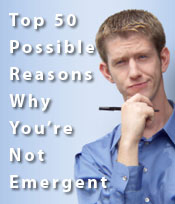
Emergent Village is looking for feedback on developing a Greenbelt type festival. And as I was taking it they included the following demographic question: “Primary Theological Orientation”. And to a certain extent I looked at the list and identified with almost every one, which made me think about Brian McLaren’s, “A Generous Orthodoxy.”
I’m a former marketing guy so I get why they want to do this. But to be honest I surprised me that Emergent would seek out this information. Facetiously, are they going to stamp this on the name tag?
Spiritual but not religious: Yes, I am a spiritual person but I can’t stand oppressive religion.
Orthodox (Eastern Rite, OCA, Coptic, etc): Yes, I’m trying to be orthodox. Aren’t we all?
Roman Catholic: Yes, even though I have serious concerns. I love the liturgy and art forms that are part of the history. The Apostle Peter was part of this church too.
Anglican (Episcopal, Anglican Church of Canada, etc) Yes, These are my brothers from up North. Need to know more though.
Methodist (UMC, AME, Nazarene, Wesleyan, etc) Yes, I love Wesley’s focus on discipleship.
Reformed (PCUSA, PCA, UCC, etc) Yes, I hope I’m reforming.
Lutheran: Yes, see “reformed”.
Anabaptist: Yes, I love the focus on Kingdom.
Pentecostal (Charismatic, etc) Yes, I truly believe the Holy Spirit is alive and well and leading for those who are listening.
Evangelical (Non-Denom, Vineyard, Southern Baptist, etc) Yes, I love the beauty of freedom and intimate worship and losing labels.
Contemplative Tradition (Quaker, etc) Yes, you bet. I need to remember to remember and reflect on the journey on a regular basis.
Metaphysical Christian (Unity, etc) Yes. It’s hard for me to knock anything that has the word unity in it. 😉
Other Religion (Buddhist, Hindu, Jewish, Muslim, etc.) Yes with an obvious asterisk. Jesus was Jewish and I have learned a tremendous amount from Hebrew culture, Buddhists and Muslims on commitment and conviction, but the real word here is human.
None: Yes, because it is hard for me to identify that I am simply one of these.
I’m being facetious with all of this to a certain extent. But the list really got me thinking about the nature of the emerging church and our desire to move past traditional belief labels and find deeper distinctions that bring us together so we can learn from each other. I recognize that we don’t have these distinctions yet. But I’m not afraid to learn from my Buddhist friend or my Anabaptist brother. I can easily imagine God speaking through them just as much as he would through an ass. I made a decision a long time ago to be open to listening to the Spirit in what ever way He chooses. I have Scripture to help me sift.
I suddenly had a renewed appreciation for what Brian was trying to accomplish with his book. How do we begin to learn from each other rather than separate ourselves? How do we learn to connect as human beings rather than disconnect based on differences? Love calls us to move past these differences and see each other for who we really are, God’s beautiful creation. We may believe differently but it doesn’t mean they each of us doesn’t need love.
My end choice was “other” for this reason. It was a good exercise though.
Which one would you pick?
Read Full Post »













